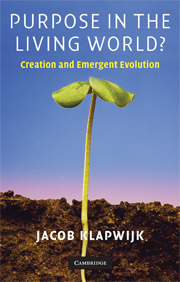Book contents
- Frontmatter
- Contents
- List of figures
- Preface
- Introduction
- 1 Does life on earth have a purpose?
- 2 Creationism, Intelligent Design, and Augustine's idea of time
- 3 Darwin, neo-Darwinism, and the naturalistic continuity claim
- 4 Miller's pre-biotic broth and the premises of evolutionism
- 5 A cold shudder along Darwin's back
- 6 The emergence theory of Morgan and Alexander
- 7 Luctor et emergo: what is emergent evolution?
- 8 Toward a general theory of emergent evolution
- 9 Hominization and the philosophy of mind
- 10 Augustinian faith and evolutionary science
- 11 The organism is a whole. The world is a habitat
- 12 The slumbering temptation of essentialism
- 13 Questions surrounding the emergence process
- 14 Enkapsis in nature. Is there an Omega point?
- Bibliography
- Index
11 - The organism is a whole. The world is a habitat
Published online by Cambridge University Press: 05 June 2012
- Frontmatter
- Contents
- List of figures
- Preface
- Introduction
- 1 Does life on earth have a purpose?
- 2 Creationism, Intelligent Design, and Augustine's idea of time
- 3 Darwin, neo-Darwinism, and the naturalistic continuity claim
- 4 Miller's pre-biotic broth and the premises of evolutionism
- 5 A cold shudder along Darwin's back
- 6 The emergence theory of Morgan and Alexander
- 7 Luctor et emergo: what is emergent evolution?
- 8 Toward a general theory of emergent evolution
- 9 Hominization and the philosophy of mind
- 10 Augustinian faith and evolutionary science
- 11 The organism is a whole. The world is a habitat
- 12 The slumbering temptation of essentialism
- 13 Questions surrounding the emergence process
- 14 Enkapsis in nature. Is there an Omega point?
- Bibliography
- Index
Summary
Emergent evolution is a theory that is of importance for the life sciences for various reasons. First, it dispenses with the Aristotelian idea that life originated by generatio spontanea (spontaneous generation of life from inanimate matter), a view that was disproved by the bacteriologist Louis Pasteur in 1862 but, under the term “abiogenesis,” is still secretly cherished by evolutionists. The theory also liberates us from the twist of thought that reason is the sheer product of an evolutionary process that was discovered by that very same reason. Furthermore, it causes us to reflect on the question of whether the standard picture of evolution pushes us into a physicalist straightjacket. It also draws our attention to the many sides of the evolutionary process: its idionomic development on physical, biotic, vegetative, sensitive, and mental levels. It also focusses us on the question of how, in a living organism, higher and lower functions correlate and how basal functions contribute to the unfolding of higher life forms. Finally, it confronts us with another kind of correlation: the question of how the evolution of life forms is accompanied by changes in the surrounding world.
The correlation problem brings us into contact with the direction in philosophy that is known as holism. Thus, in this chapter I first give a brief introduction to the concept of holism (section 1).
- Type
- Chapter
- Information
- Purpose in the Living World?Creation and Emergent Evolution, pp. 211 - 233Publisher: Cambridge University PressPrint publication year: 2008

